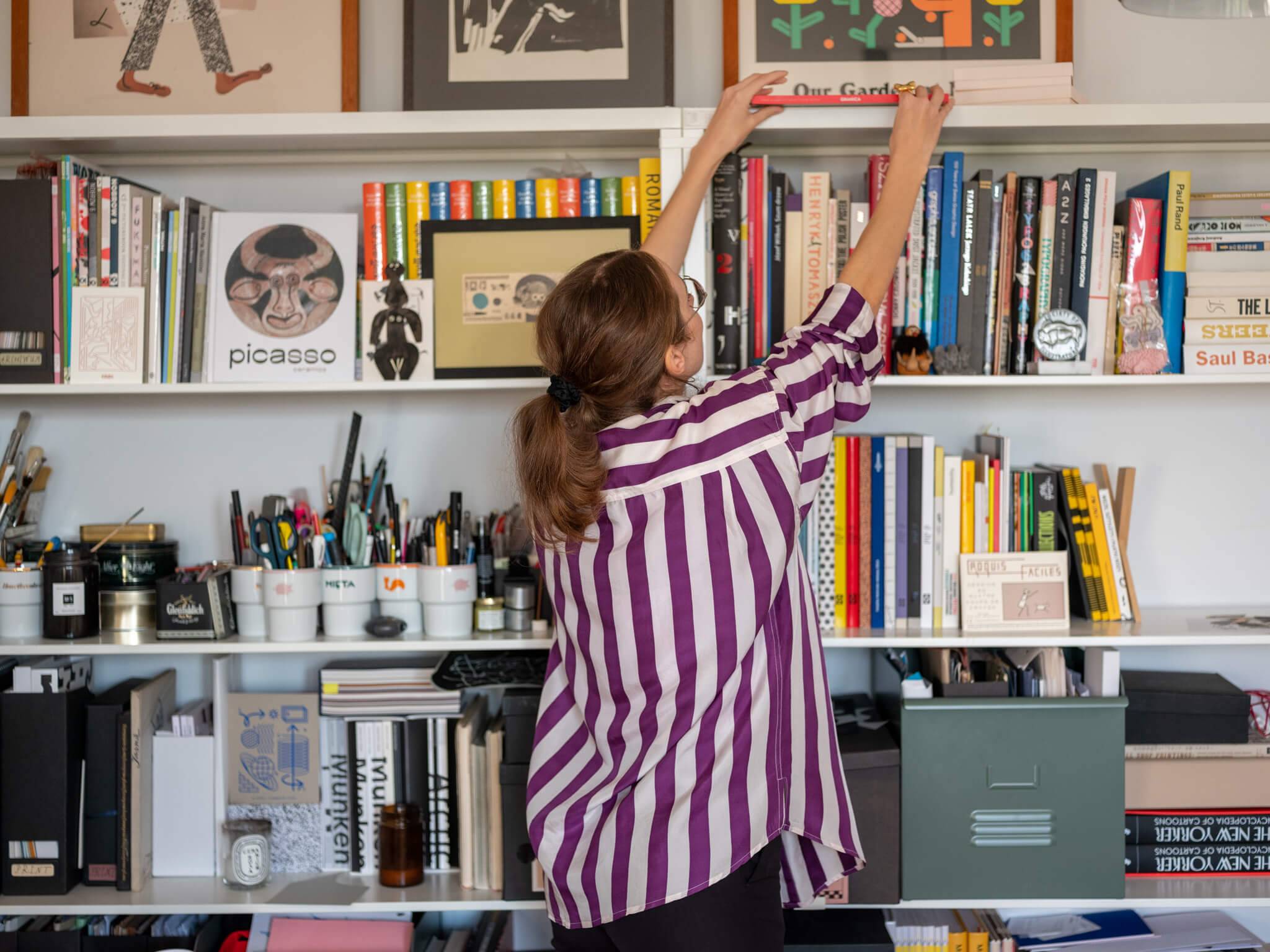Ola Niepsuj / I like to have the bigger picture
An interview with an illustrator Aleksandra Niepsuj about building the rhythm of the day, looking for mobilization and dreams.
In conversation: Bożena Kowalkowska
Photos: Dominik Cudny
I remember that a few years ago someone told me that you have an unusual organizational system, which you run on your wall. Would you tell me about it?
It is nothing innovative. I have a board on which I divide each project into individual activities – in lines, one after the other. No matter for whom I prepare the project and what its scale is, the work is always the same.
First, I prepare a brief, then a cost estimate, followed by the acceptance of conditions, preparation and signing the contract. Then comes the stage of sketches, corrections, finishing the project, finally issuing the invoice. However, my list does not end there: the last two lines concern a settlement, which must not be forgotten because, unfortunately, submitting the project does not always mean payment on the indicated date. The last stage is sharing the project on Instagram and archiving it. These are activities that are often disregarded, and in fact they are just as important as the project itself. I check off each completed stage.
Why this way and not otherwise? How did you come up with this?
I like to have a bigger picture and to know at what stage of work I currently am with each client and how many things I have to do at a particular moment. Such visualization allows me to quickly orientate myself and assess whether I need to hurry up or I can afford a relatively stress-free mode. One look is enough to know what my situation is. When there is a lot of work to do, I sometimes hire an assistant for help because although I am decent at dealing with contracts, accounting and broadly understood bureaucracy, etc., I do not have a great love for those tasks and I prefer to focus on drawing, inventing and designing. And such a board with a list of tasks allows for their efficient and quick delegation.
“The thing is that every freelance profession includes a permanent feeling of insecurity.”
Do you use the calendar at all in such a system?
I have a non-virtual calendar (necessarily in a vertical layout), but, to be honest, I rarely use it. It serves me more as a notebook for deadlines and other matters. Following your advice (!), every Monday I write down all the tasks that I have to do during a particular week and only then distribute them into specific days. I use the Google Calendar to arrange meetings, trips, zoom conferences and other tasks and events of this type. This is the way I naturally arrange my daily schedule.
Do you have your own rhythm, any kind of your favorite routine?
I have a morning routine because for almost two years I have been practicing yoga and having rehabilitation exercises four times a week at 7.30 am. I was forced to do so by external factors – I am trying to make my leg fit again after an accident. If I don’t want to be a lame old lady, I have to exercise. This is the kind of mobilization that comes entirely from outside. The awareness that I have an appointment with a trainer who comes especially for me in the morning from another district does not allow me to treat this challenge lightly. But whenever for some reason we have to cancel training and I get a set of exercises to do by myself – I immediately lose my motivation. However, these trainings make my mornings very regular: training, shower, breakfast, and at 10.00 I am already in my studio. When it comes to leaving work at a fixed time – I’m still working on it (laughs). I sometimes sit too long, but when I know that I have to get up at 6.00 on the next day, then I am doing my best not to leave work at 10.00 pm.
Are you running out of time for something?
I have always been very interested in the subject of time organization. Since I can remember, I have been reading a lot about it and checking various applications. Therefore, I find myself really good at organizing. But there’s one thing I can’t deal with. I waste too much time forcing myself to start work. Sometimes I am really ashamed of how much time I waste.
Maybe it is what the creative process is about in your case? Maybe what you call a waste of time is in fact inevitable to be able to do something interesting afterwards?
Sometimes I think about it this way too. I tell myself that my brain needs it. But I still think I could make better use of this time. And instead of browsing news, clothes and other insignificant websites, I could read something valuable. However, I am afraid that still I do not have control over this aspect.
On the other hand, do you know what makes me depressed? The fact that it is impossible to finish work. One cannot make everything done. And even if you manage to do something ahead of time at work, there is always something else to do. I have such a fantasy that I have managed to finish everything, I have set my money aside and I can refuse everything until a really fascinating challenge appears.
Do you think that it is only a fantasy? Is there no chance that this will really happen?
Yes and no. Deep down, I think that not working is possible and the problem is in fact psychological, not technical. The thing is that every freelance profession includes a permanent feeling of insecurity. The wages are not Western, but the costs of living are, so you have to undertake many assignments to earn a living. Following my dad’s advice, I also take small jobs. Because although it would be more convenient to take only large orders, it is easy to get stuck on them – something always will go not as you would like, something will take longer than expected. Thanks to small projects, my account has a constant cash inflow, even if we are talking about small sums.
Of course, I can tell myself that I will not work on the weekend, but sometimes I have to pay a price in the form of a hard Monday (laughs). Although I must admit that on my days off I try to do rather loose things, like for example creating moodboards.
What would you like the most?
I wish I had more energy for my own things. It’s not about extra time, it’s about energy. I dream of learning a new language, for example Italian. I used to attend Portuguese classes and it would be nice to go back to this practice twice a week. I am also thinking more and more about improving my software developing skills – I would like to learn how to make animations or 3D movies. It would provide me with more possibilities, but also my excitement level would be greater. Because I just like to learn.
What do you like to do in your spare time?
Like every graphic designer, who suffers from an excess of stimuli, I like being in nature. But I also need time with my relatives, so every week I visit my grandparents and eat dumplings with them. I appreciate their calmness and wisdom. This is our family time.
Ola Niepsuj / I like to have the bigger picture
An interview with an illustrator Aleksandra Niepsuj about building the rhythm of the day, looking for mobilization and dreams.
In conversation: Bożena Kowalkowska
Photos: Dominik Cudny
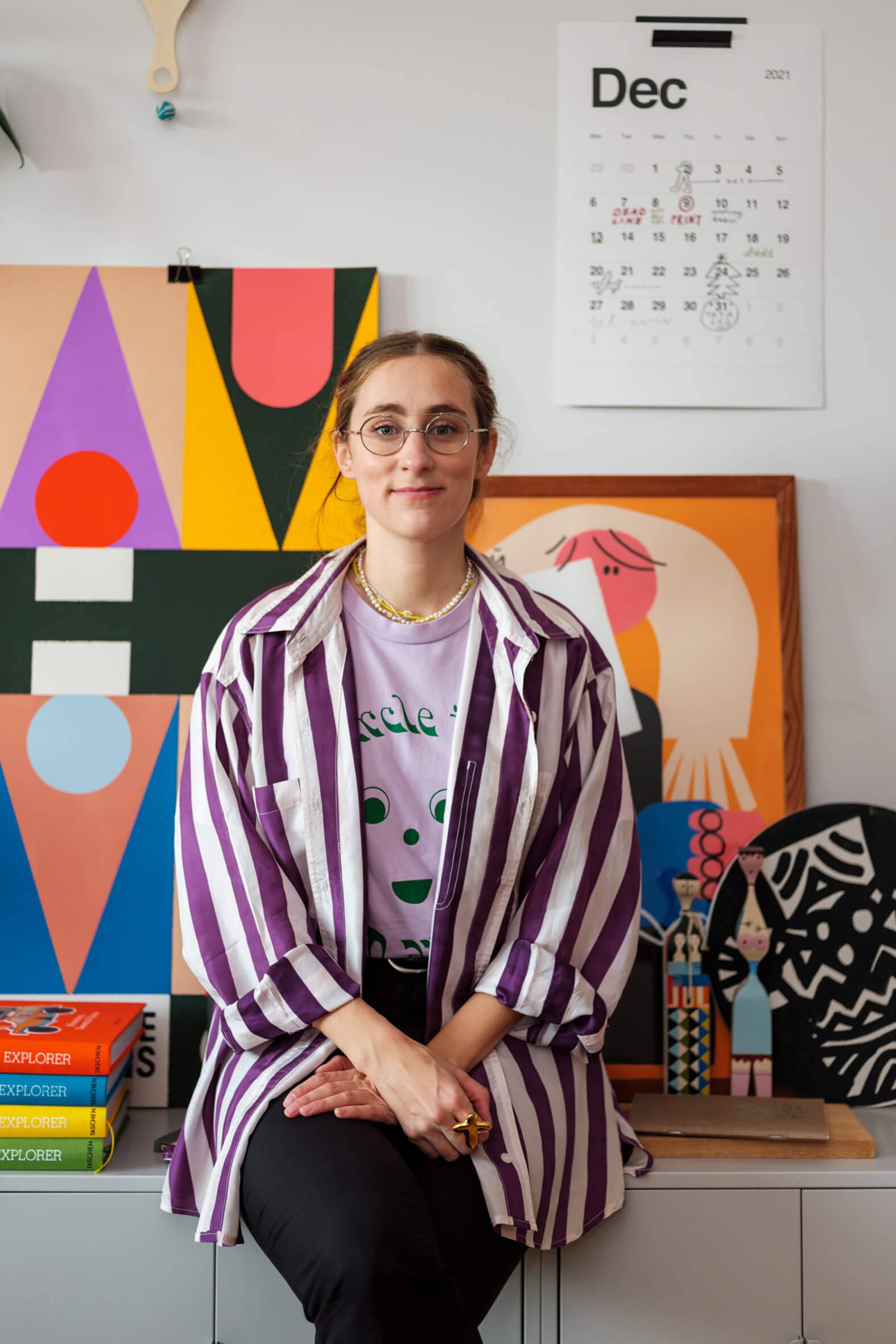
I remember that a few years ago someone told me that you have an unusual organizational system, which you run on your wall. Would you tell me about it?
It is nothing innovative. I have a board on which I divide each project into individual activities – in lines, one after the other. No matter for whom I prepare the project and what its scale is, the work is always the same.
First, I prepare a brief, then a cost estimate, followed by the acceptance of conditions, preparation and signing the contract. Then comes the stage of sketches, corrections, finishing the project, finally issuing the invoice. However, my list does not end there: the last two lines concern a settlement, which must not be forgotten because, unfortunately, submitting the project does not always mean payment on the indicated date. The last stage is sharing the project on Instagram and archiving it. These are activities that are often disregarded, and in fact they are just as important as the project itself. I check off each completed stage.
Why this way and not otherwise? How did you come up with this?
I like to have a bigger picture and to know at what stage of work I currently am with each client and how many things I have to do at a particular moment. Such visualization allows me to quickly orientate myself and assess whether I need to hurry up or I can afford a relatively stress-free mode. One look is enough to know what my situation is. When there is a lot of work to do, I sometimes hire an assistant for help because although I am decent at dealing with contracts, accounting and broadly understood bureaucracy, etc., I do not have a great love for those tasks and I prefer to focus on drawing, inventing and designing. And such a board with a list of tasks allows for their efficient and quick delegation.
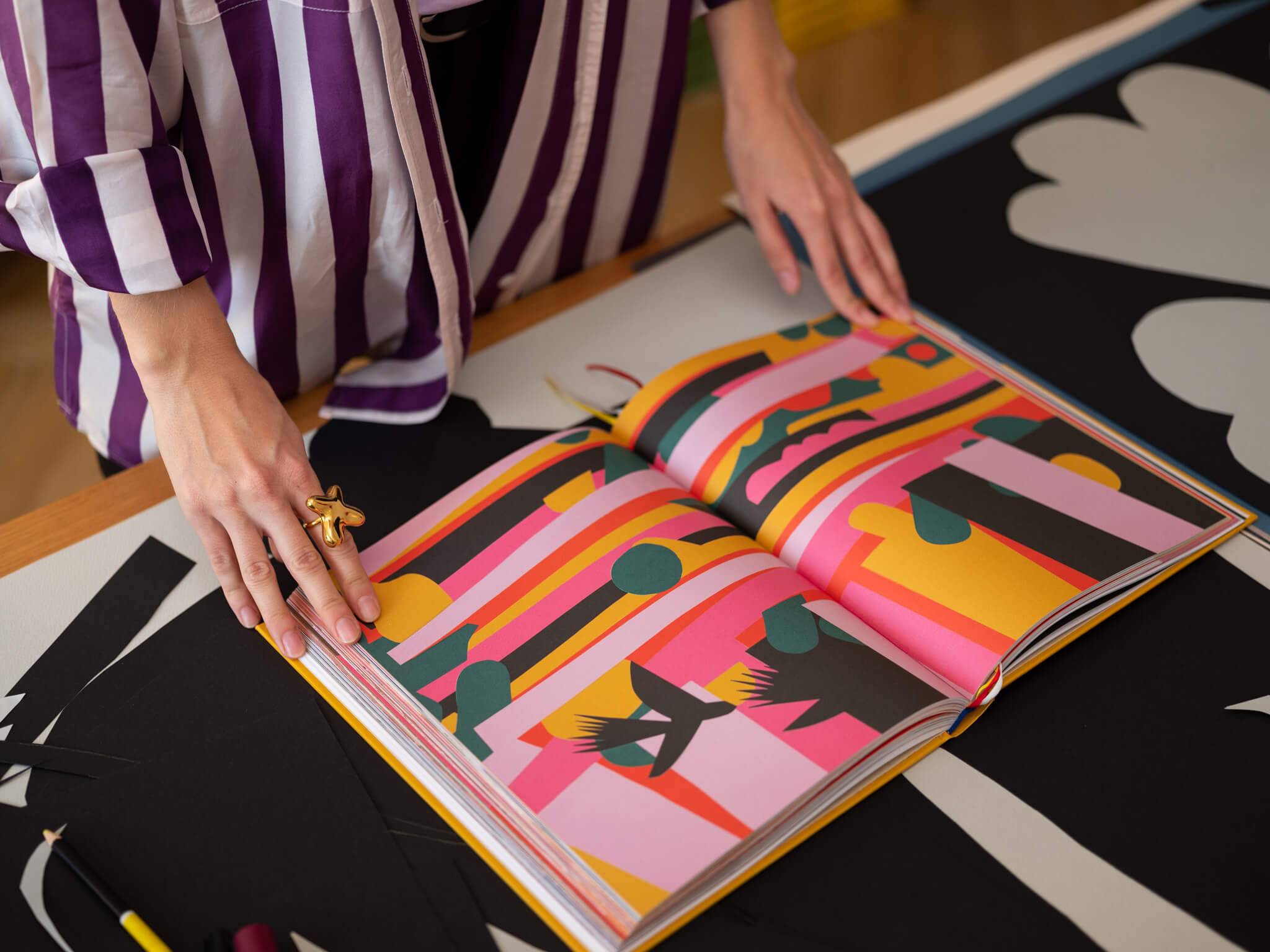
“The thing is that every freelance profession includes a permanent feeling of insecurity.”
Do you use the calendar at all in such a system?
I have a non-virtual calendar (necessarily in a vertical layout), but, to be honest, I rarely use it. It serves me more as a notebook for deadlines and other matters. Following your advice (!), every Monday I write down all the tasks that I have to do during a particular week and only then distribute them into specific days. I use the Google Calendar to arrange meetings, trips, zoom conferences and other tasks and events of this type. This is the way I naturally arrange my daily schedule.
Do you have your own rhythm, any kind of your favorite routine?
I have a morning routine because for almost two years I have been practicing yoga and having rehabilitation exercises four times a week at 7.30 am. I was forced to do so by external factors – I am trying to make my leg fit again after an accident. If I don’t want to be a lame old lady, I have to exercise. This is the kind of mobilization that comes entirely from outside. The awareness that I have an appointment with a trainer who comes especially for me in the morning from another district does not allow me to treat this challenge lightly. But whenever for some reason we have to cancel training and I get a set of exercises to do by myself – I immediately lose my motivation. However, these trainings make my mornings very regular: training, shower, breakfast, and at 10.00 I am already in my studio. When it comes to leaving work at a fixed time – I’m still working on it (laughs). I sometimes sit too long, but when I know that I have to get up at 6.00 on the next day, then I am doing my best not to leave work at 10.00 pm.
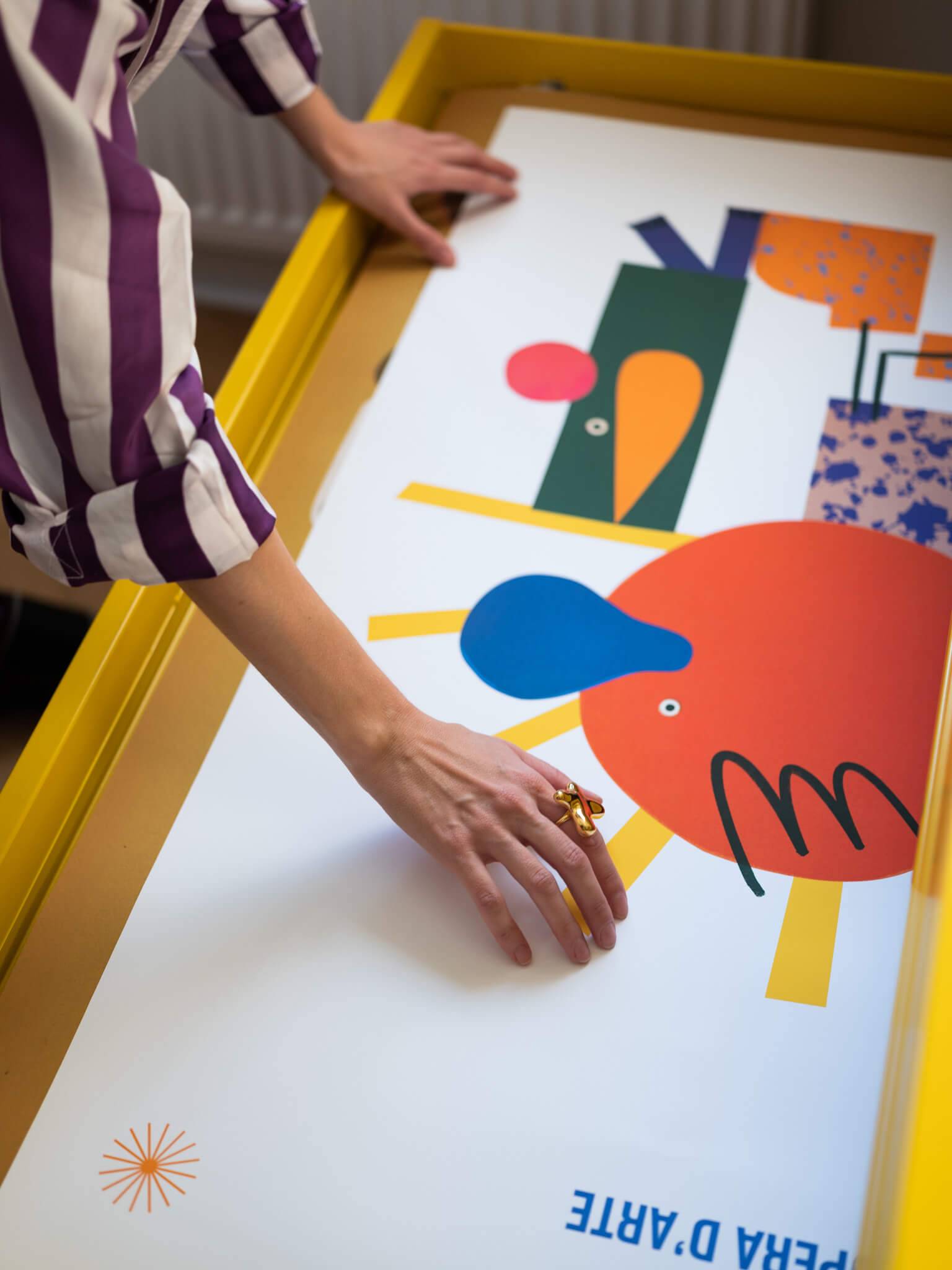
Are you running out of time for something?
I have always been very interested in the subject of time organization. Since I can remember, I have been reading a lot about it and checking various applications. Therefore, I find myself really good at organizing. But there’s one thing I can’t deal with. I waste too much time forcing myself to start work. Sometimes I am really ashamed of how much time I waste.
Maybe it is what the creative process is about in your case? Maybe what you call a waste of time is in fact inevitable to be able to do something interesting afterwards?
Sometimes I think about it this way too. I tell myself that my brain needs it. But I still think I could make better use of this time. And instead of browsing news, clothes and other insignificant websites, I could read something valuable. However, I am afraid that still I do not have control over this aspect.
On the other hand, do you know what makes me depressed? The fact that it is impossible to finish work. One cannot make everything done. And even if you manage to do something ahead of time at work, there is always something else to do. I have such a fantasy that I have managed to finish everything, I have set my money aside and I can refuse everything until a really fascinating challenge appears.
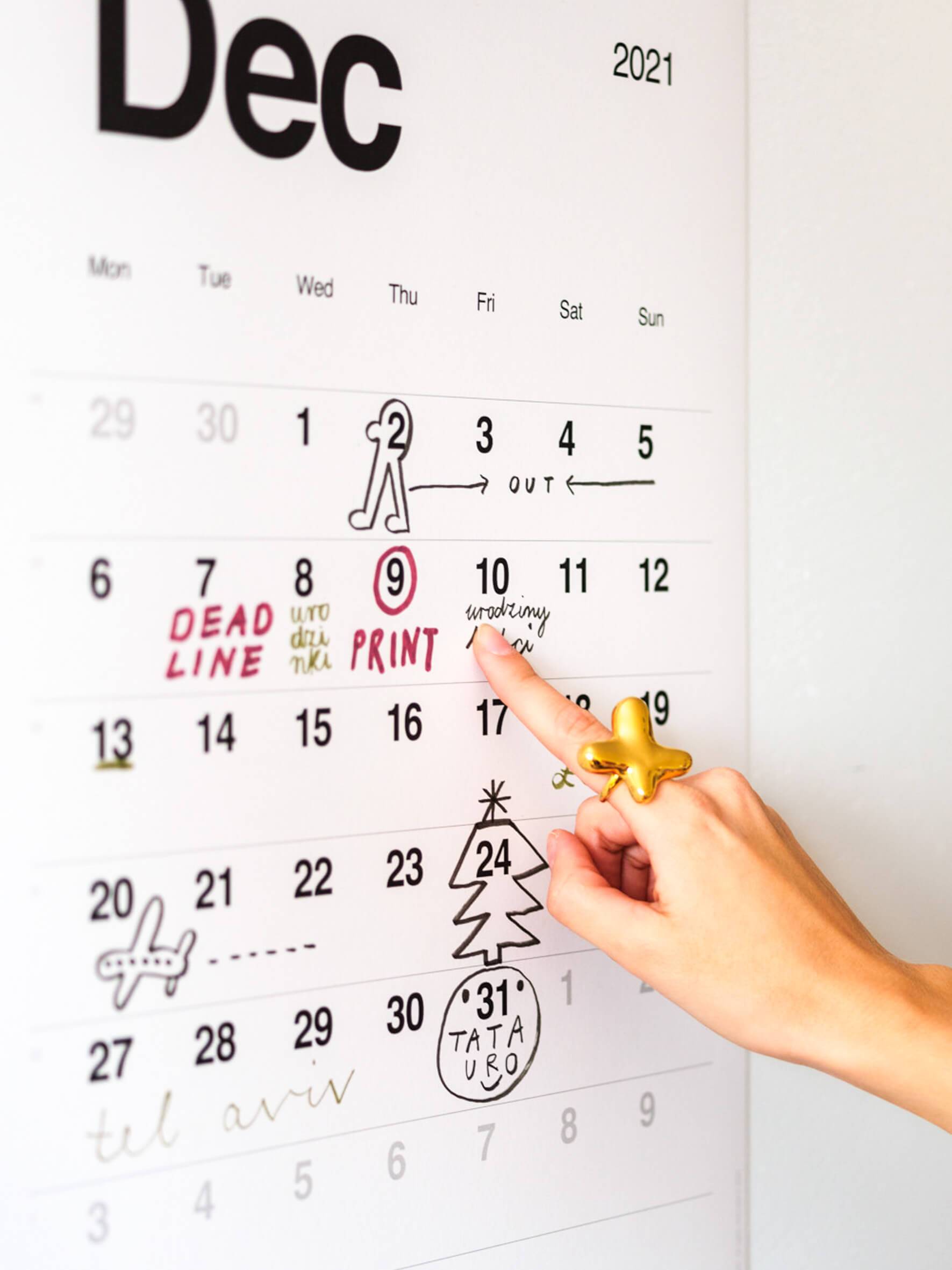
Do you think that it is only a fantasy? Is there no chance that this will really happen?
Yes and no. Deep down, I think that not working is possible and the problem is in fact psychological, not technical. The thing is that every freelance profession includes a permanent feeling of insecurity. The wages are not Western, but the costs of living are, so you have to undertake many assignments to earn a living. Following my dad’s advice, I also take small jobs. Because although it would be more convenient to take only large orders, it is easy to get stuck on them – something always will go not as you would like, something will take longer than expected. Thanks to small projects, my account has a constant cash inflow, even if we are talking about small sums.
Of course, I can tell myself that I will not work on the weekend, but sometimes I have to pay a price in the form of a hard Monday (laughs). Although I must admit that on my days off I try to do rather loose things, like for example creating moodboards.
What would you like the most?
I wish I had more energy for my own things. It’s not about extra time, it’s about energy. I dream of learning a new language, for example Italian. I used to attend Portuguese classes and it would be nice to go back to this practice twice a week. I am also thinking more and more about improving my software developing skills – I would like to learn how to make animations or 3D movies. It would provide me with more possibilities, but also my excitement level would be greater. Because I just like to learn.
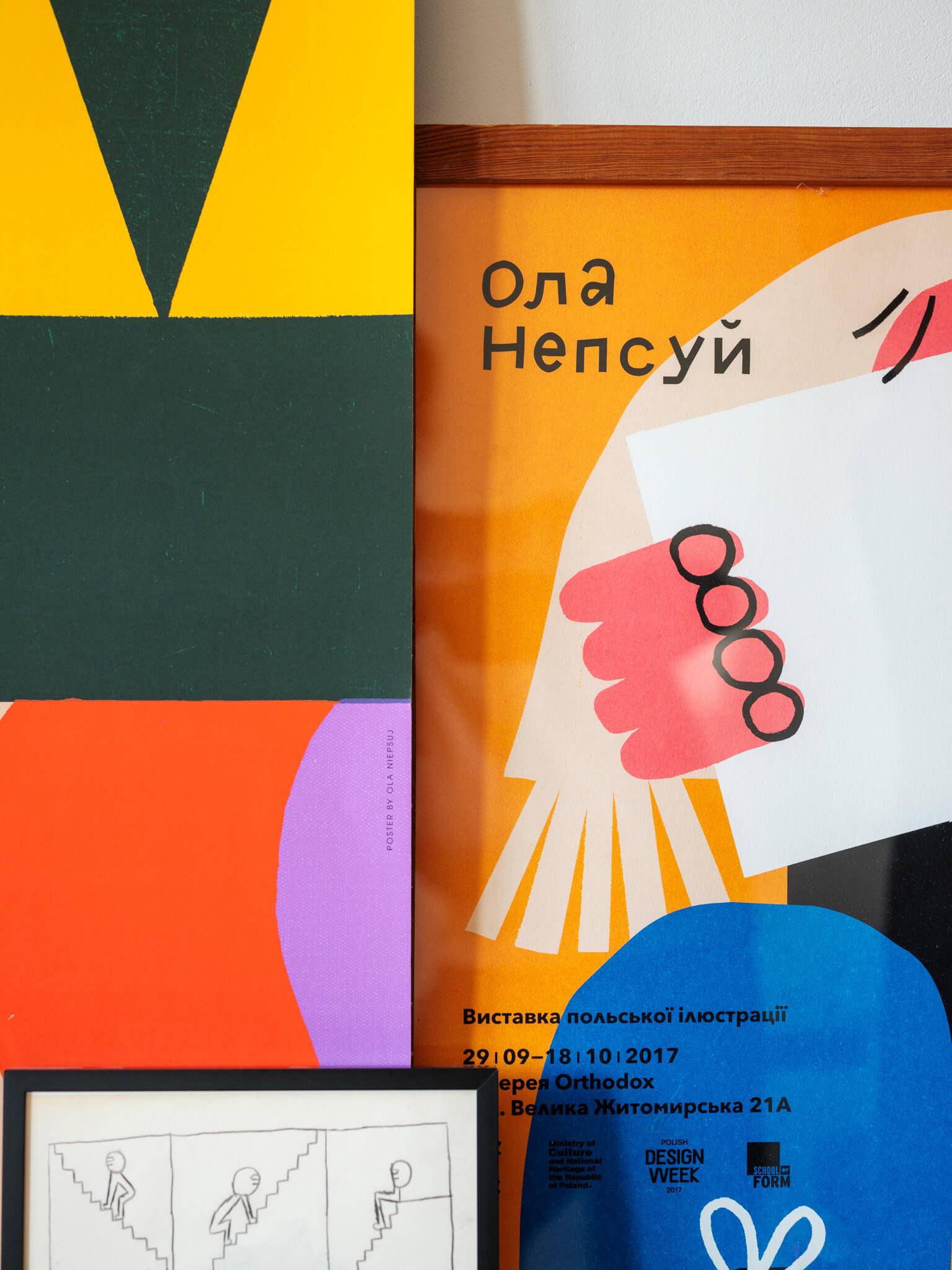
What do you like to do in your spare time?
Like every graphic designer, who suffers from an excess of stimuli, I like being in nature. But I also need time with my relatives, so every week I visit my grandparents and eat dumplings with them. I appreciate their calmness and wisdom. This is our family time.
